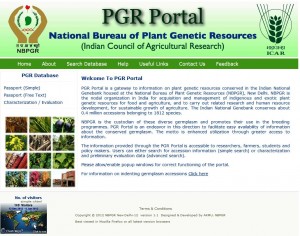 I’m not entirely sure how we missed that data on India’s enormous germplasm collection is now online. While this is welcome, I think it’s fair to say that NBPGR’s PGR Portal still needs some work in terms of user experience. It took me a while to figure out, for example, that if you type a letter under “Crop/Plant Name,” in Passport or in Characterization and Evaluation Search, you get a list of crops beginning with that letter, which you can then choose from. 1 Once you do that you get a list of taxonomic names to choose from, but you can only select one at a time to do your search. And why no rice data at all? There is a nice way of looking at the distribution of different character states for each characterization and evaluation descriptor, but no mapping facility. And you can’t use the portal to order germplasm. To do that you have to fill in a form, which makes no mention of the International Treaty on PGRFA or its SMTA, and email it in. And there are some funny restrictions on use: “All users can search and see the desired information. only registered users can copy and download.” But I couldn’t find a way to register. So, good to see, though clearly a work in progress. Will follow its development closely, and hope to see it link up with Genesys in due course, joining the CGIAR, European and US genebanks.
I’m not entirely sure how we missed that data on India’s enormous germplasm collection is now online. While this is welcome, I think it’s fair to say that NBPGR’s PGR Portal still needs some work in terms of user experience. It took me a while to figure out, for example, that if you type a letter under “Crop/Plant Name,” in Passport or in Characterization and Evaluation Search, you get a list of crops beginning with that letter, which you can then choose from. 1 Once you do that you get a list of taxonomic names to choose from, but you can only select one at a time to do your search. And why no rice data at all? There is a nice way of looking at the distribution of different character states for each characterization and evaluation descriptor, but no mapping facility. And you can’t use the portal to order germplasm. To do that you have to fill in a form, which makes no mention of the International Treaty on PGRFA or its SMTA, and email it in. And there are some funny restrictions on use: “All users can search and see the desired information. only registered users can copy and download.” But I couldn’t find a way to register. So, good to see, though clearly a work in progress. Will follow its development closely, and hope to see it link up with Genesys in due course, joining the CGIAR, European and US genebanks.
All excited about the new Indian online database for plant genetic resources, I tried to do a simple passport search and got as far as listing a crop and species name. Then no more joy.
A similar search through the full text search mask led no further results.
Downloading the tutorial (4.x MB) twice resulted in two incomplete files (159 KB, 438 KB). It could be a slow connection problem at either end, however, all this supports Luigi’s assessment of a work in progress.
I am looking forward to being able to download a complete set of passport data with geographic co-ordinates for a crop such as grasspea (Lathyrus sativus).
A link of the Indian data with GBIF would also be very welcome.